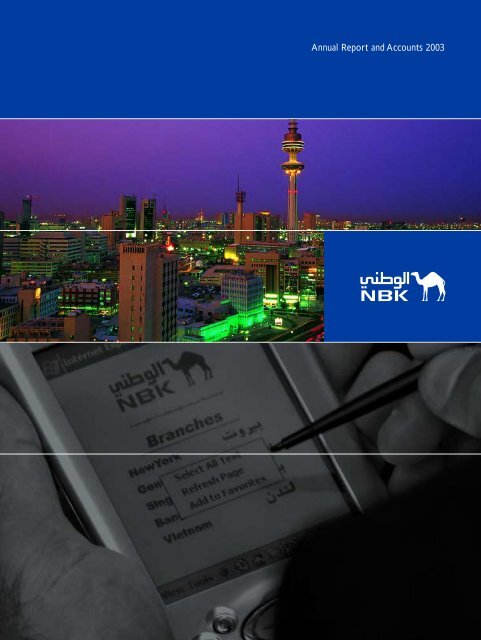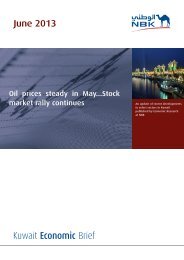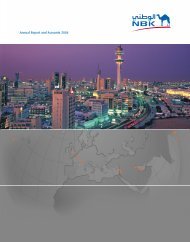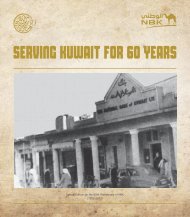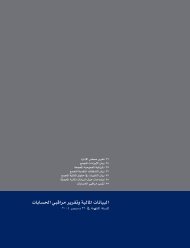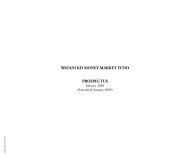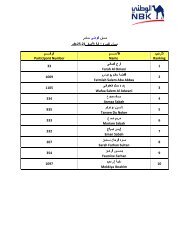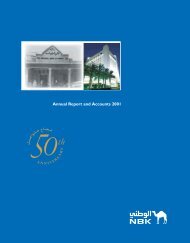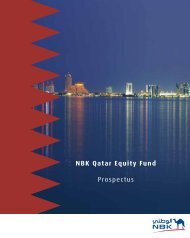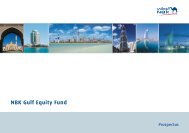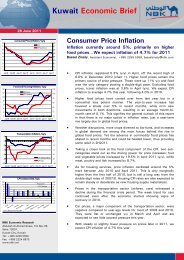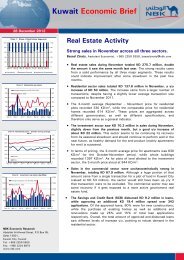Annual Report 2003 - National Bank of Kuwait
Annual Report 2003 - National Bank of Kuwait
Annual Report 2003 - National Bank of Kuwait
Create successful ePaper yourself
Turn your PDF publications into a flip-book with our unique Google optimized e-Paper software.
<strong>Annual</strong> <strong>Report</strong> and Accounts <strong>2003</strong>
His Highness Sheikh Jaber<br />
Al-Ahmad Al-Jaber Al-Sabah<br />
Emir <strong>of</strong> the State <strong>of</strong> <strong>Kuwait</strong><br />
His Highness Sheikh Saad<br />
Al-Abdullah Al-Salem Al-Sabah<br />
Crown Prince <strong>of</strong> the<br />
State <strong>of</strong> <strong>Kuwait</strong><br />
His Excellency Sheikh Sabah<br />
Al-Ahmad Al-Jaber Al-Sabah<br />
Prime Minister <strong>of</strong> the<br />
State <strong>of</strong> <strong>Kuwait</strong><br />
Contents<br />
2 Board <strong>of</strong> Directors<br />
4 Chairman’s Message<br />
8 Review <strong>of</strong> Activities<br />
19 Economic Developments in <strong>Kuwait</strong><br />
25 Financial Statements and Auditors’ <strong>Report</strong><br />
52 Group Directory
Our Vision<br />
To be the premier Arab bank<br />
To achieve consistently superior returns for our shareholders<br />
To deliver world class products and services to our customers<br />
To invest in people<br />
To benefit the communities in which we operate<br />
During <strong>2003</strong>, NBK moved closer to<br />
achieving its vision, posting record<br />
pr<strong>of</strong>itability and growth, and achieving<br />
improved performance in all areas <strong>of</strong><br />
operations, both at home and abroad.
Board <strong>of</strong> Directors<br />
Mohammed Abdul Rahman Al Bahar<br />
Chairman<br />
Nasser Musaed Abdullah Al Sayer<br />
Deputy Chairman<br />
Yacoub Yousef Al Hamad<br />
Member<br />
Hamad Abdul Aziz Al Sager<br />
Member<br />
Nasser Mohammed Abdul Mohsin Al Kharafi<br />
Member<br />
Mohammed Sulaiman Al Sayed Ali Al Rifai<br />
Member<br />
Ghassan Ahmed Saoud Al Khalid<br />
Member<br />
Yacoub Yousef Al Fulaij<br />
Member<br />
2
1<br />
2<br />
3<br />
6<br />
4<br />
5<br />
7 8<br />
1 Mohammed Abdul Rahman Al Bahar<br />
2 Nasser Musaed Abdullah Al Sayer<br />
3 Yacoub Yousef Al Hamad<br />
4 Hamad Abdul Aziz Al Sager<br />
5 Nasser Mohammed Abdul Mohsin Al Kharafi<br />
6 Mohammed Sulaiman Al Sayed Ali Al Rifai<br />
7 Ghassan Ahmed Saoud Al Khalid<br />
8 Yacoub Yousef Al Fulaij<br />
3
Chairman’s Message<br />
Mohammed Abdul Rahman Al-Bahar<br />
Chairman<br />
NBK’s performance during <strong>2003</strong> was outstanding.<br />
We generated record results and enhanced the<br />
<strong>Bank</strong>’s leadership in all business segments, while<br />
staying focused on our strategy.We pursued growth<br />
opportunities while maintaining our discipline in<br />
managing risk and cost and, at the same time, taking<br />
bold steps to ensure growth can be sustained in<br />
the future. Among these steps were a number <strong>of</strong><br />
initiatives to solidify our fundamental strengths, and<br />
to continue building upon NBK’s strong brand<br />
equity and reputation as the bank that customers<br />
know and trust to meet their diverse financial<br />
needs with the highest standards <strong>of</strong> integrity.<br />
Reaffirming our vision and values<br />
In a year in which governance, integrity, and values<br />
were under close scrutiny worldwide, NBK continued<br />
to flourish, just as it did for over half a century,<br />
passionately committed to delivering superior value<br />
to shareholders, customers, and the community, with<br />
whom our relationship is defined by trust and integrity.<br />
At NBK, we are committed to the highest standards<br />
<strong>of</strong> corporate governance, starting with a well balanced<br />
and active Board that exercises strong oversight on<br />
an independent management team; transparency and<br />
accountability at all levels <strong>of</strong> the organisation; and<br />
above all, moral and ethical conduct fostered by a<br />
culture that holds trust as the basis for everything<br />
we do. In short, we have and shall remain a good<br />
corporate citizen, fulfilling its social responsibilities<br />
while delivering value to all stakeholders.<br />
The NBK vision summarises our aspiration to be<br />
the premier Arab bank.This entails an unrelenting<br />
focus on growth, performance, and continuous<br />
improvement. Our efforts, achievements and<br />
initiatives this past year were a direct manifestation<br />
<strong>of</strong> this focus, and have placed us in an ever better<br />
position to realise our vision.<br />
Performance driven<br />
NBK’s record <strong>of</strong> consistent growth in pr<strong>of</strong>itability<br />
since its inception in 1952 is one manifestation <strong>of</strong><br />
our performance driven culture. We are proud <strong>of</strong><br />
this record and <strong>of</strong> the superior returns generated<br />
to shareholders that place NBK not only among the<br />
top performing banks in the region, but also among<br />
leading international banks and financial institutions.<br />
We maintained this record in <strong>2003</strong>, during which the<br />
Group’s net pr<strong>of</strong>it rose by 14.3 percent to KD 121.3<br />
million (US$ 412.0 million), a new record for NBK.<br />
Earnings per share rose to 82 fils compared to 72 fils,<br />
and return on equity increased to 27.7 percent.<br />
I am also pleased to announce that the Board <strong>of</strong><br />
Directors has proposed to the General Assembly<br />
payment <strong>of</strong> a cash dividend <strong>of</strong> 50 percent <strong>of</strong> the<br />
nominal value <strong>of</strong> shares outstanding, up to the date<br />
<strong>of</strong> the General Assembly meeting, in addition to<br />
raising the <strong>Bank</strong>’s paid-up capital by 5 percent<br />
through the issuance <strong>of</strong> bonus shares.<br />
These financial results confirm our success, as does<br />
our performance relative to the competition, and so<br />
do our financial strength ratings that stand highest<br />
4
NBK’s record <strong>of</strong> consistent growth in pr<strong>of</strong>itability since inception<br />
in 1952 is one manifestation <strong>of</strong> our performance driven culture.<br />
among all emerging market banks. During <strong>2003</strong>,<br />
Standard & Poor’s raised our long-term credit rating<br />
to ‘A’, based on our strong financial pr<strong>of</strong>ile, prudent<br />
risk management practices and healthy pr<strong>of</strong>itability.<br />
Other leading international rating agencies, including<br />
Moody’s and FitchRatings, maintained their top<br />
ratings for NBK.<br />
Growth with discipline<br />
Our performance in <strong>2003</strong> comes against a backdrop<br />
<strong>of</strong> a tenuous global recovery, with interest rates<br />
remaining at 45-year lows and keeping pressure on<br />
interest margins. NBK’s challenge was to expand<br />
business volume and increase non-interest income.<br />
The opportunity was presented by positive domestic<br />
fundamentals, coupled with rapid change in the<br />
region’s geopolitical environment, which quickly<br />
switched from being a source <strong>of</strong> uncertainty to one<br />
full <strong>of</strong> promise for future growth and stability.<br />
The winds <strong>of</strong> change in the region were quickly<br />
reflected in the pace <strong>of</strong> local activity, with investment,<br />
spending and cross-border transactions increasing<br />
dramatically.This proved to be a boon for NBK’s<br />
corporate and investment banking businesses, given<br />
our capabilities and pricing power. Ballooning trade,<br />
as reflected in oil exports, domestic imports and<br />
re-exports to Iraq allowed us to apply our distinctive<br />
skills in trade finance. A buoyant local stock market<br />
and the comeback in international markets provided<br />
considerable opportunities in the private banking and<br />
wealth management areas.The impact on household<br />
income and consumer spending, which also benefited<br />
from strong demographic trends, helped NBK<br />
capitalise on its leadership in retail banking, specifically<br />
in consumer credit business.<br />
The positive business environment provided us with<br />
many opportunities to exploit our fundamental<br />
strengths. Our strategy <strong>of</strong> focusing on customers,<br />
anticipating their needs, and <strong>of</strong>fering innovative and<br />
integrated financial solutions made it possible for us<br />
to increase our penetration <strong>of</strong> pr<strong>of</strong>itable segments<br />
and to deepen our relationship with valuable<br />
customers.We also remained faithful to our discipline<br />
<strong>of</strong> balancing risks against rewards and controlling<br />
costs. Our prudent risk and cost management culture<br />
has been tested over time and proved to be a source<br />
<strong>of</strong> strength that we are committed to maintain.<br />
Regional expansion<br />
NBK’s focus on meeting customer needs has been<br />
one <strong>of</strong> the drivers behind our geographic expansion<br />
strategy. NBK has long had a focused presence<br />
in the major international centres.The currency<br />
focus is on strengthening our presence within the<br />
region to support corporate customers’ expansion<br />
plans.This will also allow us to exploit growth<br />
opportunities in markets where we can leverage<br />
our competitive advantage.<br />
To this end, we have opened a full-service onshore<br />
bank in Bahrain alongside our <strong>of</strong>fshore branch there.<br />
Preparatory steps were made to open a new branch<br />
in Jordan, followed by one in Saudi Arabia. We are<br />
also making efforts to enter Qatar, Iraq and other<br />
5
Chairman’s Message<br />
markets. Meanwhile, as part <strong>of</strong> the winning<br />
consortium that has recently started operating the<br />
Trade <strong>Bank</strong> <strong>of</strong> Iraq, we hope to support the activities<br />
<strong>of</strong> our <strong>Kuwait</strong>i customers in this promising market.<br />
Beyond our region, yet still within a major trade zone<br />
for <strong>Kuwait</strong>, Singapore’s monetary authorities upgraded<br />
NBK’s <strong>of</strong>fshore licence to a wholesale banking unit.<br />
The Singapore branch will continue to serve as a hub<br />
for NBK’s activities in Asia and the Pacific.<br />
Striving to improve ourselves<br />
To maintain NBK’s edge and further strengthen<br />
our competitive advantage, we took a critical look<br />
inside the <strong>Bank</strong> this year to identify opportunities<br />
for improvement. Our review covered the various<br />
businesses, technologies, processes and people.<br />
On the business side, we reviewed the <strong>Bank</strong>’s strategy<br />
based on in-depth analysis <strong>of</strong> markets and customers,<br />
utilising the unique knowledge we have accumulated<br />
over many years. We identified a number <strong>of</strong> key<br />
strategic initiatives that will drive NBK’s growth over<br />
the long-term and determined how these should be<br />
implemented. Several initiatives have already been<br />
launched and we expect positive results as early as<br />
next year not only in financial terms, but also through<br />
other key performance indicators.<br />
On the technology side, we examined the fit between<br />
NBK’s business strategy and information technology<br />
to ensure we have the right match. We inititated a<br />
number <strong>of</strong> projects designed to improve efficiency<br />
and maintain the <strong>Bank</strong>’s technological edge.<br />
NBK’s commitment to continuous improvement is<br />
based on the belief that how we do things is as<br />
important as what we do. A program was initiated<br />
to identify ways <strong>of</strong> improving efficiency at all levels<br />
<strong>of</strong> the organisation.This included performance<br />
management systems that will foster better alignment<br />
between individual initiatives and the <strong>Bank</strong>’s overall<br />
strategic vision.<br />
How we execute these various initiatives will<br />
ultimately determine the long-term results.We have<br />
great faith in our senior management team that is<br />
considerably experienced in managing change and in<br />
leading the organisation towards becoming a worldclass<br />
financial services provider.This strong and stable<br />
team has demonstrated its ability over time, and<br />
much credit is due to its members for the <strong>Bank</strong>’s<br />
superior performance. Indeed, it is one <strong>of</strong> the pillars<br />
<strong>of</strong> strength at NBK, which renews our confidence in<br />
our ability to realise our full potential and to create<br />
enduring shareholder value.<br />
Social responsibility<br />
The welfare and development <strong>of</strong> our community<br />
are integral elements <strong>of</strong> the NBK values. Our size<br />
and standing in the local market also make this an<br />
important social responsibility.The <strong>Bank</strong>’s community<br />
programs provide support to various charitable,<br />
cultural, social and athletic activities. However, this<br />
is only one facet <strong>of</strong> our commitment to benefit<br />
the communities in which we operate.<br />
6
We identified a number <strong>of</strong> key strategic initiatives that will<br />
drive NBK’s growth over the long-term and determined how<br />
these should be implemented.<br />
This year, NBK gave special attention to supporting<br />
the elderly.The proceeds <strong>of</strong> an annual charitable<br />
campaign held during the Holy month <strong>of</strong> Ramadan<br />
were donated to a home for the aged established by<br />
the Ministry <strong>of</strong> Labor and Social Affairs. In the past,<br />
such campaigns have focused on the health and<br />
welfare <strong>of</strong> children, the elderly and the disabled, who<br />
we continue to support through various other<br />
activities, including the specialised children’s hospital<br />
built at the <strong>Bank</strong>’s own expense and donated to the<br />
Ministry <strong>of</strong> Health three years ago.<br />
With appreciation<br />
In conclusion, and on behalf <strong>of</strong> the Board <strong>of</strong> Directors,<br />
I would like to express our sincere gratitude and<br />
appreciation to His Highness the Emir Sheikh Jaber<br />
Al-Ahmad Al-Jaber Al-Sabah, His Highness the Crown<br />
Prince Sheikh Saad Al-Abdullah Al-Salem Al-Sabah, His<br />
Excellency the Prime Minister Sheikh Sabah Al-Ahmad<br />
Al-Jaber Al-Sabah, and to members <strong>of</strong> the Council <strong>of</strong><br />
Ministers and <strong>National</strong> Assembly, for their wise<br />
management <strong>of</strong> the nation’s economic policies.<br />
Our appreciation also goes to our shareholders for<br />
their continued support and confidence, which have<br />
been invaluable for NBK’s growth and development.<br />
We are particularly grateful to our customers for<br />
their trust and loyalty, and we assure them <strong>of</strong> our<br />
unfailing commitment to uphold the NBK promise<br />
<strong>of</strong> high quality and convenient services that meet,<br />
or exceed, their needs.<br />
In closing, we thank and acknowledge our employees,<br />
who never waver in their commitment to NBK and<br />
its mission, and whose tireless efforts stand behind<br />
our successes and outstanding results. Without any<br />
doubt, our management team is the most talented<br />
and our people’s integrity, innovation, teamwork and<br />
commitment give me tremendous confidence in our<br />
ability to meet the challenges that lie ahead.<br />
Mohammed Abdul Rahman Al-Bahar<br />
Chairman<br />
We also thank the Central <strong>Bank</strong> <strong>of</strong> <strong>Kuwait</strong> for its<br />
prudent management <strong>of</strong> monetary policy and oversight<br />
<strong>of</strong> the financial sector, and to the Ministry <strong>of</strong> Finance,<br />
the Ministry <strong>of</strong> Commerce and Industry, the Chamber<br />
<strong>of</strong> Commerce and Industry, and all government<br />
departments and agencies, for their cooperation<br />
with the banking and financial sector <strong>of</strong> <strong>Kuwait</strong>.<br />
7
Review <strong>of</strong> Activities<br />
During <strong>2003</strong>, NBK successfully leveraged its<br />
expertise, technology, financial strength and strong<br />
relationship with customers to solidify its leading<br />
market position and to continue its evolution into a<br />
premier financial services supermarket in the Arab<br />
world, able to compete effectively with global banks.<br />
In each <strong>of</strong> its activities, the <strong>Bank</strong> follows best<br />
practices and <strong>of</strong>fers best-<strong>of</strong>-breed products<br />
and services that meet the financial needs <strong>of</strong> its<br />
customers.The markets we serve in the region have<br />
also been expanded giving us greater ability to<br />
remain close to our customers as they expand, as<br />
well as spread our reach into these new markets.<br />
Consumer <strong>Bank</strong>ing<br />
The customer comes first…<br />
A customer-centric strategy continued to define the<br />
operations <strong>of</strong> the Consumer <strong>Bank</strong>ing Group.The<br />
<strong>Bank</strong> has succeeded in building customer loyalty by<br />
diligently meeting the needs <strong>of</strong> distinct customer<br />
segments, <strong>of</strong>fering them the widest range <strong>of</strong> products<br />
and quality services in a convenient manner. In this<br />
pursuit, leading-edge technology has played a central<br />
role, providing us with the right tools to identify<br />
customer needs accurately and enhancing our<br />
distribution with an array <strong>of</strong> automated delivery<br />
channels which complement the largest branch<br />
network in <strong>Kuwait</strong>.<br />
Responding to customer needs requires that we<br />
focus on serving them through the different stages<br />
in their lives. Main events such as graduation, car<br />
and home purchase, marriage, planning for children’s<br />
education and retirement require products designed<br />
to meet a specific need. Our personalised services<br />
and customised product <strong>of</strong>ferings cater to the needs<br />
<strong>of</strong> all segments <strong>of</strong> the population from the most<br />
established high-net worth customers to young<br />
children who constitute our future customer base.<br />
The <strong>Bank</strong> <strong>of</strong>fers young customers specialised services<br />
through Zeina for children and Al Azraq for teens,<br />
allowing them to open their first bank account and<br />
obtain benefits such as reward points, discounts at<br />
key stores in <strong>Kuwait</strong>, and internet access. Mustaqbal<br />
<strong>of</strong>fers young university graduates starting their first<br />
job a package <strong>of</strong> services geared to their needs, such<br />
as an ATM card, special loans and discount credit<br />
cards. Affluent customers receive the special service<br />
<strong>of</strong> a Personal <strong>Bank</strong>ing Officer to provide them with<br />
the attention they require to manage their finances.<br />
Officers are trained to advise customers on wealth<br />
management strategies and ensure that they are well<br />
positioned financially for their future.<br />
At NBK, customer loyalty is built on providing quality<br />
<strong>of</strong> service that is superior. For the past seven years,<br />
the service quality program has ensured NBK’s<br />
leadership in the local market through its systematic<br />
8
Relationship staff at branches and in the<br />
Call Centre are highly trained and motivated<br />
to serve customers to the highest standards.<br />
benchmarking <strong>of</strong> service quality. Relationship staff in<br />
branches and in the Call Centre are highly trained and<br />
motivated to serve customers according to the highest<br />
standards and are evaluated by internal and external<br />
auditors to ensure they meet these standards.<br />
To ensure we always provide the best service<br />
possible to our customers, the <strong>Bank</strong> continues to<br />
develop its Customer Relationship Management<br />
(CRM) system.The system allows our staff to<br />
deploy state-<strong>of</strong>-the-art technology to optimise their<br />
interaction with customers across all channels. Staff<br />
can tap the CRM to gain insight about each customer<br />
to provide the best advice on key services and on<br />
managing their finances effectively.<br />
NBK <strong>of</strong>fers the widest range <strong>of</strong> products and services<br />
in the country from traditional deposit accounts and<br />
loan packages to credit cards and a full range <strong>of</strong><br />
mutual funds and insurance products. Our loans<br />
address the needs <strong>of</strong> <strong>Kuwait</strong>i nationals as well as a<br />
large number <strong>of</strong> working expatriates.<br />
The <strong>Bank</strong> has also succeeded in promoting its credit<br />
cards through the successful Watani Gifts rewards<br />
program that is tied to card usage, allowing the<br />
<strong>Bank</strong> to differentiate its <strong>of</strong>fering and build customer<br />
value and loyalty.<br />
NBK continued to give a high priority to developing<br />
its network <strong>of</strong> branches and other delivery channels.<br />
Through upgrading, use <strong>of</strong> state-<strong>of</strong>-the-art technology<br />
and outsourcing we ensure our ability to leverage<br />
the latest advances in all aspects <strong>of</strong> our operations,<br />
communication and provision <strong>of</strong> service to customers.<br />
This year, the Call Centre received a complete<br />
system upgrade using cutting edge technology. NBK’s<br />
telephone banking service is now available 24 hours<br />
a day, every day <strong>of</strong> the year – a first in <strong>Kuwait</strong>.<br />
NBK has <strong>of</strong>ten been the first to introduce innovative<br />
products in the market, such as the first chip-enabled<br />
Smart Card in <strong>Kuwait</strong>, expanding the usage <strong>of</strong> debit<br />
cards to enable online purchases on NBK’s website,<br />
and establishing a bill payment program with the<br />
leading mobile telecommunication provider.<br />
9
Review <strong>of</strong> Activities<br />
Corporate <strong>Bank</strong>ing<br />
Creative and integrated services…<br />
NBK has maintained its leadership in providing<br />
banking services to companies doing business in<br />
<strong>Kuwait</strong>. Both domestic and international businesses<br />
appreciate the sophisticated and integrated services<br />
we <strong>of</strong>fer. We have built a strong franchise in this<br />
market by maintaining solid relationships with leading<br />
corporate customers, large oil corporations,<br />
government agencies, investment houses and other<br />
institutional clients. Our strength in this arena is<br />
further enhanced by our ability to anticipate and<br />
meet our customers’ banking needs.<br />
Our ongoing strategy is to direct our efforts and<br />
resources to deliver exceptional service and superior<br />
value to clients while maintaining high asset quality.<br />
Careful execution <strong>of</strong> this strategy has enabled the<br />
Group to achieve aggressive targets <strong>of</strong> revenue<br />
growth and cost control.This helped enhance our<br />
already strong position in the corporate lending<br />
market where we hold the largest portfolio <strong>of</strong><br />
corporate debt in <strong>Kuwait</strong>.<br />
The Corporate <strong>Bank</strong>ing Group responded<br />
successfully to challenges stemming from geopolitical<br />
instability in the region, and succeeded in achieving<br />
its aggressive targets <strong>of</strong> revenue growth, cost control<br />
and maintaining NBK’s superior market position. We<br />
maintained our ongoing strategy to exert every effort<br />
and direct all resources to delivering top class service<br />
and high value to our corporate customers while<br />
maintaining high asset quality.<br />
International companies doing business in <strong>Kuwait</strong><br />
continue to choose NBK over other banks for their<br />
local banking needs, ensuring our overwhelming<br />
dominance in the sector.The <strong>Bank</strong>’s leadership<br />
position can be attributed to our proven ability to<br />
provide real value to international corporates with<br />
tailor-made financing packages. Adherence to the<br />
highest pr<strong>of</strong>essional standards, our strong corporate<br />
relationships, and our international presence helped<br />
the foreign corporate unit win the business for almost<br />
all public sector contracts awarded to international<br />
companies during the year.<br />
Trade finance activity saw unprecedented growth<br />
during <strong>2003</strong> with gross turnover increasing by 40<br />
percent. A number <strong>of</strong> mega transactions had a<br />
marked impact as did the increased trade volume<br />
seen with Iraq.The resumption <strong>of</strong> trade with Iraq<br />
following the demise <strong>of</strong> the former regime ensured<br />
significant growth in letters <strong>of</strong> credit.<br />
In <strong>2003</strong>, NBK was part <strong>of</strong> a consortium <strong>of</strong><br />
international banks selected by the Coalition<br />
Provisional Authority and the Governing Council <strong>of</strong><br />
Iraq to manage the new Trade <strong>Bank</strong> <strong>of</strong> Iraq. NBK’s<br />
role in the consortium was key to winning the award,<br />
owing to our substantial experience in the region<br />
and the volume <strong>of</strong> our business in the market.<br />
Our innovative electronic banking service for<br />
businesses, Watani Online Corporate (WOLC),<br />
continues to differentiate NBK in the local market<br />
and reflects our leadership in the use <strong>of</strong> technology.<br />
10
The service provides us with a clear advantage<br />
in serving large institutions with special cash<br />
management needs.<br />
Wealth Management<br />
Customised solutions…<br />
NBK maintained a unique and leading position in<br />
wealth management, achieving growth in our key<br />
businesses and implementing bold initiatives intended<br />
to enhance our competitive edge in order to take<br />
full advantage <strong>of</strong> growth opportunities. Wealth<br />
management includes two major business lines: Private<br />
<strong>Bank</strong>ing, and Asset Management. Integrated teams <strong>of</strong><br />
skilled pr<strong>of</strong>essionals from both areas work together<br />
to help individual customers with their specific needs.<br />
Private <strong>Bank</strong>ing extends a comprehensive range <strong>of</strong><br />
banking and investment products and services to a<br />
broad customer base <strong>of</strong> high net-worth individuals<br />
and families. We have long-standing relationships that<br />
span generations. Our focus is to understand and<br />
satisfy our customers’ varied financial needs through<br />
superior service and competitive long-term returns.<br />
Our success starts with a solid personal relationship<br />
between our private banking <strong>of</strong>ficer and each<br />
customer.This is complemented by a full range <strong>of</strong><br />
integrated private banking facilities, investment and<br />
portfolio management, mutual funds, private equity,<br />
trust services, real estate finance and services, credit<br />
and investment finance, customised banking and<br />
advisory services.<br />
Our highly trained and experienced <strong>of</strong>ficers are<br />
dedicated to devising solutions that meet their<br />
customers’ short and long-term investment targets.<br />
Officers use state-<strong>of</strong>-the-art tools to design unique<br />
investment strategies and asset allocation based on<br />
each customer’s individual risk tolerance and<br />
performance targets.<br />
NBK’s edge lies in its proximity to local customers.<br />
Our clients are served in an air <strong>of</strong> confidentiality and<br />
pr<strong>of</strong>essionalism at our head <strong>of</strong>fice, a select number<br />
<strong>of</strong> local branches and our extensive international<br />
network located in the world’s major financial centres.<br />
The network includes a wholly-owned Geneva-based<br />
subsidiary, <strong>National</strong> <strong>Bank</strong> <strong>of</strong> <strong>Kuwait</strong> (Suisse), that is<br />
positioned to <strong>of</strong>fer customers the confidentiality and<br />
security characterising Swiss banking, and more. In<br />
addition to <strong>of</strong>fering convenience, our network allows<br />
NBK to compete on a global level with some <strong>of</strong><br />
the world’s largest and well-established banks.<br />
NBK’s asset management business focuses on<br />
providing our customers with advice and management<br />
<strong>of</strong> their assets to ensure that they achieve their<br />
financial objectives. Wealth management services are<br />
delivered through three subsidiaries, each focused<br />
on and dedicated to meeting the needs <strong>of</strong> different<br />
investor groups.The three business units are steadfast<br />
in their mission to <strong>of</strong>fer high net-worth, institutional<br />
and retail customers a broad range <strong>of</strong> investment<br />
products and services including personalised wealth<br />
management services, separately-managed accounts,<br />
mutual funds and Islamic funds.<br />
11
<strong>National</strong> <strong>Bank</strong> <strong>of</strong> <strong>Kuwait</strong> (Suisse) SA, based in Geneva<br />
is NBK’s wholly-owned private banking subsidiary that<br />
caters to the needs <strong>of</strong> high net-worth individuals and<br />
wealthy families. NBK Suisse achieved outstanding<br />
results in <strong>2003</strong>, despite the challenging market<br />
environment, <strong>of</strong>fering a broad range <strong>of</strong> high quality<br />
portfolio management services, advisory services,<br />
custodianship, family trusts and foundations.<br />
NBK Investment Management Ltd (NBKIM), based in<br />
London serves the needs <strong>of</strong> institutional investors<br />
based on discretionary investment mandates.This<br />
joint venture with Morgan Stanley has produced good<br />
results for its clients as most managed portfolios have<br />
outperformed their respective benchmarks.<br />
NBK Global Asset Management (NBK GAM) <strong>of</strong>fers<br />
our domestic retail investors a wide range <strong>of</strong> mutual<br />
funds and Islamic funds.The Watani & Al-Kawthar<br />
Islamic families <strong>of</strong> funds span most asset classes<br />
including global equities and bonds, money-market<br />
funds in <strong>Kuwait</strong>i dinars, US dollars and Euros, an Islamic<br />
leasing (Ijara) fund, a hedge fund, principal guaranteed<br />
as well as US and European real estate funds.<br />
A major addition to our value added services during<br />
<strong>2003</strong> was the introduction <strong>of</strong> the Fundselect<br />
program. Fundselect is an “open architecture<br />
platform” that <strong>of</strong>fers our customers access to top<br />
performing investment managers and world-class<br />
investment expertise, within a framework tailored to<br />
customers’ particular investment needs. Fundselect<br />
products combine the unparalleled fund research<br />
capabilities <strong>of</strong> Standard & Poor’s and the asset<br />
allocation, portfolio construction and performance<br />
measurement skills <strong>of</strong> the UK-based Schroders<br />
Investment Management Company to deliver best-<strong>of</strong>breed<br />
products to our clients. NBK is the only<br />
institution in the Middle East and one <strong>of</strong> a handful <strong>of</strong><br />
global financial institutions to <strong>of</strong>fer such investment<br />
services to its clients.<br />
Investment <strong>Bank</strong>ing<br />
Universal services…<br />
NBK is a leading player in the provision <strong>of</strong> investment<br />
banking services in the region, leveraging its expertise<br />
and financial strength to achieve superior results for<br />
clients. We <strong>of</strong>fer a comprehensive range <strong>of</strong> corporate<br />
finance and financial advisory services for companies<br />
in <strong>Kuwait</strong> and across the Middle East. Our services<br />
span the spectrum from advising and underwriting to<br />
lead managing and arranging a number <strong>of</strong> the largest<br />
deals in the Middle East. In <strong>2003</strong>, Euromoney<br />
Magazine recognised NBK as the Best Mergers and<br />
Acquisitions (M&A) House in <strong>Kuwait</strong>.<br />
The year <strong>2003</strong> was a busy one. In January, NBK acted<br />
as sole financial advisor to MTC-Vodafone in its<br />
acquisition <strong>of</strong> a 91.6 percent equity interest in Jordan<br />
Mobile Telephone Services Company Ltd. (Fastlink)<br />
for $423.9 million.The acquisition <strong>of</strong> Fastlink marked<br />
MTC-Vodafone’s first move in its regional expansion<br />
plans.The company chose NBK as its strategic<br />
partner in the implementation <strong>of</strong> this strategy.<br />
12
Review <strong>of</strong> Activities<br />
In <strong>2003</strong>, Euromoney Magazine recognised NBK as the<br />
Best Mergers and Acquisitions House in <strong>Kuwait</strong>.<br />
With NBK leading the acquisition process on behalf<br />
<strong>of</strong> MTC-Vodafone, the <strong>Bank</strong> demonstrated its ability<br />
to successfully execute large M&A deals with<br />
effectiveness and efficiency.The transaction was the<br />
largest-ever equity acquisition in the Arab world<br />
and was by far the largest private sector investment<br />
venture in Jordan by a corporation from the Gulf<br />
Cooperation Council (GCC) .<br />
In April, NBK also acted as sole financial advisor to<br />
MTC-Vodafone in its successful bid for the second<br />
mobile licence in the Kingdom <strong>of</strong> Bahrain. NBK led<br />
the licence application process and the negotiations<br />
with the Bahraini authorities.The licence was granted<br />
to MTC-Vodafone Bahrain, a subsidiary <strong>of</strong> MTC-<br />
Vodafone. Bahraini authorities had received ten<br />
applications for the licence from international and<br />
regional applicants.<br />
In September, NBK acted again as sole financial<br />
advisor to MTC-Vodafone, this time in its successful<br />
bid for one <strong>of</strong> the three mobile licences <strong>of</strong>fered by<br />
the Coalition Provisional Authority in Iraq. NBK led<br />
the application and negotiation process on behalf<br />
<strong>of</strong> MTC-Vodafone.<br />
In October, NBK advised <strong>Kuwait</strong> Investment Authority<br />
(KIA) on the disposal <strong>of</strong> a 49 percent equity interest<br />
in Sassoon Holdings Pte Ltd, a financial brokerage<br />
company based in Singapore with operations in the<br />
Far East and Western Europe. NBK led the process<br />
and negotiations with the buyer on behalf <strong>of</strong> KIA, and<br />
executed the transaction in a seamless manner.<br />
Internet and e.Business<br />
Superior service through leading technology…<br />
NBK maintains its lead position in the Internet and<br />
mobile commerce and banking arenas. Our success<br />
is due to NBK embracing the Internet and other<br />
technologies as more than just an alternative delivery<br />
channel. We understand that such technologies are<br />
a completely different way <strong>of</strong> providing financial<br />
services to customers. We have made a commitment<br />
to deliver value added services, customer convenience<br />
and security by leveraging state-<strong>of</strong>-the-art technologies.<br />
In <strong>2003</strong>, NBK’s pioneering online presence has earned<br />
us the award <strong>of</strong> Best Internet <strong>Bank</strong> in <strong>Kuwait</strong> and the<br />
Middle East by Global Finance.<br />
Our online banking <strong>of</strong>fering, Watani Online, was<br />
completely revamped during the year. Changes<br />
brought a new look and feel, improved functionality<br />
and personalisation functions. Customers are now<br />
able to create their personal pr<strong>of</strong>ile, ‘MyWOL’,<br />
enabling them to customise their homepage to better<br />
serve their banking and financial needs. NBK was the<br />
first bank in <strong>Kuwait</strong> and the region to <strong>of</strong>fer such<br />
personalisation features in its online banking <strong>of</strong>fering.<br />
These initiatives have helped increase Watani Online<br />
users to over 70,000, with the service representing<br />
7 percent <strong>of</strong> the <strong>Bank</strong>’s delivery mix. WOL continues<br />
to grow at a rapid pace with transactions rising at an<br />
average <strong>of</strong> 8 percent a month.<br />
13
Review <strong>of</strong> Activities<br />
Our success is due to NBK embracing the<br />
Internet and other technologies as more than<br />
just an alternative delivery channel.<br />
During the year, NBK’s Watani Online service was<br />
enhanced to enable customers to better manage<br />
their finances. In addition to traditional enquiry and<br />
international transfer services, our bill payment<br />
infrastructure makes NBK the leader in bill payment<br />
services.Through a number <strong>of</strong> strategic partnerships,<br />
NBK customers can use our on-line channel with its<br />
advanced payment infrastructure to pay utility and<br />
phone bills, mobile telephone bills, book and purchase<br />
movie tickets, and pay school tuition fees.<br />
We are also currently upgrading our online bill<br />
payment infrastructure to comply with the rules and<br />
regulations <strong>of</strong> Visa. As a result <strong>of</strong> this upgrade NBK<br />
will be the only financial institution in <strong>Kuwait</strong> and<br />
among a few in the region complying with Visa’s<br />
highest standards, ensuring our customers have the<br />
most secure and reliable online and mobile payment<br />
services possible.<br />
The past year saw the <strong>Bank</strong>’s bilingual website,<br />
www.nbk.com, transformed into a mini-portal providing<br />
users with banking as well as general content based<br />
on customer feedback.The website, which serves as<br />
the gateway to all our online services, can be<br />
personalised by allowing customers to create their<br />
own “MYNBK.com”.The website continues to be a<br />
successful medium for communicating NBK news and<br />
events to visitors through banners and emails. NBK<br />
uses targeted emails to send advertisements and<br />
newsletters, keeping customers informed <strong>of</strong> new<br />
services, promotions and special events.<br />
The <strong>Bank</strong> continues to capitalise on the potential <strong>of</strong><br />
our SMS service, NBK Mobile, to promote products<br />
and services to targeted groups <strong>of</strong> customers, in<br />
addition to providing them with financial alerts.This<br />
service, along with our other internet and e.business<br />
initiatives, demonstrate NBK’s commitment to<br />
embracing state-<strong>of</strong>-the-art technologies to provide<br />
customers with the utmost convenience in handling<br />
their financial affairs.<br />
International <strong>Bank</strong>ing<br />
Focused expansion…<br />
NBK’s international presence is a key asset allowing<br />
us to provide comprehensive financial services to our<br />
customers, from corporations and business people to<br />
wealthy individuals and those who travel frequently.<br />
The NBK Group international network includes<br />
<strong>National</strong> <strong>Bank</strong> <strong>of</strong> <strong>Kuwait</strong> (International) PLC, based<br />
in London and Paris, <strong>National</strong> <strong>Bank</strong> <strong>of</strong> <strong>Kuwait</strong> (Suisse)<br />
in Geneva, and <strong>National</strong> <strong>Bank</strong> <strong>of</strong> <strong>Kuwait</strong> (Lebanon)<br />
SAL in Beirut, in addition to branches in New York,<br />
Singapore and Bahrain, and associated representative<br />
<strong>of</strong>fices in Bangkok and Ho Chi Minh City.<br />
The <strong>Bank</strong> is proceeding with plans to expand in the<br />
region. During <strong>2003</strong>, we opened an onshore<br />
commercial branch in Bahrain, which complements<br />
our existing <strong>of</strong>fshore banking unit. Preparatory steps<br />
are being taken to open branches in Jordan and Saudi<br />
Arabia during the first and third quarters <strong>of</strong> 2004,<br />
respectively.These branches will provide a full range<br />
<strong>of</strong> banking services to our customer base serving the<br />
14
corporate, institutional and private investors, and will<br />
complement the <strong>Bank</strong>’s existing international network.<br />
A full range <strong>of</strong> corporate, treasury, trade finance,<br />
retail and private banking services are provided by<br />
the International <strong>Bank</strong>ing Group. We pay particular<br />
attention to the needs <strong>of</strong> the <strong>Bank</strong>’s traditional<br />
customer base <strong>of</strong> exporters and contracting<br />
companies involved in the public and private sectors<br />
in <strong>Kuwait</strong> and the Gulf. Within the treasury and<br />
foreign exchange markets, we continue to pursue<br />
a policy <strong>of</strong> conservative risk management, with a<br />
particular focus on servicing clients in the Middle East.<br />
Highlights <strong>of</strong> our international operations were<br />
as follows:<br />
• The tentative global recovery provided the<br />
opportunity to undertake a number <strong>of</strong> select<br />
transactions in our international credit portfolio,<br />
while maintaining the overall emphasis on diversifying<br />
exposures in terms <strong>of</strong> counter-parties, sectors,<br />
economies and regions.<br />
• Real estate advisory services are provided by our<br />
New York, London, Paris and Lebanon <strong>of</strong>fices.The<br />
New York <strong>of</strong>fice also acts as a consultant to the real<br />
estate fund recently launched in <strong>Kuwait</strong>. Due to<br />
increased demand by <strong>Kuwait</strong>i customers related to<br />
the acquisition or financing <strong>of</strong> residential real estate<br />
in Lebanon, the <strong>Bank</strong>’s Lebanon subsidiary has<br />
become particularly active in this area.<br />
• NBK’s contract support package, provided by a<br />
team <strong>of</strong> pr<strong>of</strong>essionals in London, New York, Paris and<br />
Singapore, was made available to our Western and<br />
Asian contracting customers who continued to be<br />
active in <strong>Kuwait</strong> throughout the year. Our New York<br />
branch also worked closely with US contractors<br />
providing them with financial services to support<br />
their rebuilding activities in Iraq.<br />
• NBK (International) in London maintained a<br />
strong focus on providing support to customers<br />
involved in contracts and projects in <strong>Kuwait</strong> and the<br />
region.These core activities, combined with a well<br />
diversified lending business, provided stable and<br />
growing income against the backdrop <strong>of</strong> economic<br />
and political uncertainty.<br />
• Our International <strong>Bank</strong>ing Group’s treasury team<br />
continued to provide the highest quality service to our<br />
relationship clients, resulting in volume growth through<br />
positive referrals.The <strong>Bank</strong> has continued to manage<br />
risks under a conservative framework, with a limited<br />
reliance on speculative positions, and within strictly<br />
defined and maintained risk parameters for such<br />
exposures. Such a disciplined approach protected the<br />
<strong>Bank</strong> from adverse market events throughout <strong>2003</strong>.<br />
As a result, the treasury continued to be a significant<br />
contributor to the <strong>Bank</strong>’s overall pr<strong>of</strong>itability.<br />
15
Review <strong>of</strong> Activities<br />
• The <strong>Bank</strong>’s New York <strong>of</strong>fice increased its US dollar<br />
clearing business during the year and is on track to<br />
surpass last year’s record, transferring in excess <strong>of</strong><br />
$2 billion daily from a client base consisting <strong>of</strong><br />
government agencies, investment companies, financial<br />
institutions, oil companies and banks throughout the<br />
Arab world. WITSWEB, introduced two years ago as<br />
an online banking product for corporate clients who<br />
need secure communications over the Internet, has<br />
been successfully adopted by all our clients and<br />
enabled the branch to attract new accounts from<br />
Gulf-based businesses.<br />
• During the year Lebanon saw an increased<br />
number <strong>of</strong> <strong>Kuwait</strong>is visiting the country, particularly<br />
during the summer period. Working hours were<br />
extended in some branches to accommodate<br />
customer requirements. With its nine branches<br />
located in popular tourist and commercial areas, the<br />
Lebanon operation is geared to provide superior<br />
service to <strong>Kuwait</strong>i and Lebanese customers, <strong>of</strong>fering<br />
a full range <strong>of</strong> banking services to suit their needs.<br />
• The Bahrain <strong>of</strong>fshore banking unit continued to<br />
provide a full range <strong>of</strong> Treasury and wholesale banking<br />
services to a broad customer base throughout the<br />
Middle East and North Africa. During the year the<br />
branch selectively participated as lead manager in<br />
several syndications, FRNs and bond <strong>of</strong>ferings in both<br />
primary and secondary markets.<br />
• The Bahrain retail branch opened in August <strong>2003</strong><br />
to provide a full range <strong>of</strong> retail and corporate banking<br />
services to domestic clients as well as <strong>Kuwait</strong>i investors,<br />
corporates and tourists. Since opening, the branch has<br />
provided loans to corporate and high net-worth<br />
clients and trade finance business.<br />
• The Singapore branch, supported by representative<br />
<strong>of</strong>fices in Thailand and Vietnam, continued to provide<br />
a full range <strong>of</strong> wholesale banking products to the<br />
<strong>Bank</strong>’s customers, including a 24-hour Treasury<br />
service. In May <strong>2003</strong> the Monetary Authority <strong>of</strong><br />
Singapore, as part <strong>of</strong> its banking liberalisation<br />
program, upgraded eight Offshore <strong>Bank</strong>s including<br />
NBK SAK Singapore to Wholesale <strong>Bank</strong>ing status.<br />
The banks were assessed on several criteria, including<br />
financial strength, contributions and commitment to<br />
developing Singapore’s financial sector.<br />
• NBK Group’s customers find London and Paris<br />
convenient and secure locations for deposits, whether<br />
for expenses when travelling in Europe or for longerterm<br />
investment security.<br />
Treasury<br />
Leading market maker…<br />
NBK is an important player in the local money and<br />
foreign exchange markets.The <strong>Bank</strong>’s treasury division<br />
plays the role <strong>of</strong> market maker for the <strong>Kuwait</strong>i dinar<br />
both domestically and internationally. In the local<br />
interbank money market NBK is a net lender providing<br />
other local banks with cash management facilities for<br />
their short-term and medium-term cash flow needs.<br />
16
The treasury division works closely with other<br />
areas in the <strong>Bank</strong>, including our international<br />
branches in the world’s major financial centres.<br />
The <strong>Bank</strong> <strong>of</strong>fers a wide range <strong>of</strong> treasury, asset and<br />
liquidity management services to our customers.The<br />
treasury division works closely with other areas in<br />
the <strong>Bank</strong>, including our international branches in the<br />
world’s major financial centres, providing innovative<br />
and cost effective solutions to corporate and<br />
institutional customers.<br />
Risk Management<br />
Discipline and prudence…<br />
Efficient risk management is a core discipline <strong>of</strong> NBK<br />
to maintain its stability and quality <strong>of</strong> assets.The<br />
comprehensive global risk management framework<br />
adopted by the <strong>Bank</strong> has continued to evolve in light<br />
<strong>of</strong> the Group’s expanding activities, and has once again<br />
proven its effectiveness.This framework is designed<br />
to produce an accurate and timely evaluation <strong>of</strong> the<br />
<strong>Bank</strong>’s risk exposure in addition to ensuring risk is<br />
effectively controlled and mitigated.The system allows<br />
NBK to manage firm-wide exposure to credit, market,<br />
liquidity and operational risks.<br />
Credit risk management at the <strong>Bank</strong> is based on two<br />
tenets: “focused diversification” and “prudent lending”.<br />
The Domestic and International Credit Control<br />
Divisions constantly monitor the quality <strong>of</strong> the <strong>Bank</strong>’s<br />
credit portfolio and ensure the <strong>Bank</strong>’s adherence to<br />
the strictest credit policies.This has enabled NBK to<br />
maintain the highest asset quality.<br />
The <strong>Bank</strong>’s exposure to market risk is managed by<br />
the Asset and Liability Executive Committee. Market<br />
risk arises from the mismatch between assets and<br />
liabilities.This mainly occurs in the non-traded banking<br />
book, and is actively managed by employing a number<br />
<strong>of</strong> non-statistical market risk management techniques<br />
including various position and sensitivity limits.The<br />
<strong>Bank</strong> supplements this approach by using an internal<br />
model to statistically measure and analyse the valueat-risk<br />
(VAR) arising from movements in various<br />
market prices.The process is also supported by stress<br />
testing to simulate the effects <strong>of</strong> potential extreme<br />
market movements under a number <strong>of</strong> scenarios.<br />
Liquidity risk is monitored and evaluated on a daily<br />
basis. In addition to ensuring that the <strong>Bank</strong>’s balance<br />
sheet pr<strong>of</strong>ile complies with regulatory requirements,<br />
the Treasury Division is actively involved in cash flow<br />
management and in meeting the <strong>Bank</strong>’s funding needs<br />
at all times.<br />
Management <strong>of</strong> operational risk also receives high<br />
priority and is controlled by the <strong>Bank</strong>’s Operational<br />
Risk and Compliance functions. Operational risk is<br />
measured across a number <strong>of</strong> processes based on<br />
the probability and impact <strong>of</strong> risks, together with the<br />
potential mitigating effects <strong>of</strong> controls and insurance.<br />
Formal procedures and internal controls are<br />
continuously improved and streamlined to ensure<br />
their effectiveness without interfering with the<br />
conduct <strong>of</strong> business.This process is supported by a<br />
strong Internal Audit function, through independent<br />
review, and an Insurance and Risk Financing function.<br />
17
Review <strong>of</strong> Activities<br />
Potentially extreme events are also evaluated.The<br />
<strong>Bank</strong> has a sound business resumption plan built on<br />
the foundations <strong>of</strong> a fully equipped disaster recovery<br />
centre.The centre is tested quarterly to ensure that,<br />
in the event <strong>of</strong> a disaster disabling our main data<br />
centre, the <strong>Bank</strong> can restore a complete range <strong>of</strong><br />
services within three hours.<br />
Finally, as a component <strong>of</strong> the overall risk management<br />
<strong>of</strong> the <strong>Bank</strong>, anti-money laundering and combating<br />
terrorism financing initiatives are constantly challenged<br />
and reviewed to ascertain full compliance with local<br />
requirements and international best practice. Formal<br />
procedures and mandatory training programs are in<br />
effect. Adherence to procedures is monitored by the<br />
Anti-Money Laundering and Combating Terrorism<br />
Financing Unit, Compliance and Internal Audit Functions.<br />
NBK and the Community<br />
Social responsibility…<br />
At NBK, we recognise that the support and trust we<br />
receive from the community is key to our success.<br />
As such, we are committed to giving back to the<br />
community, through charitable programs, sponsorship<br />
and participation in community activities. We also<br />
encourage our staff to volunteer and participate<br />
actively in social, charitable and athletic activities.<br />
As the future <strong>of</strong> <strong>Kuwait</strong>, children have always been<br />
at the heart <strong>of</strong> our community programs. Our<br />
financial support to the <strong>Kuwait</strong> Association for Caring<br />
for Hospitalised Children is complemented by special<br />
staff visits to children, elderly and disabled patients in<br />
a number <strong>of</strong> hospitals and public homes in <strong>Kuwait</strong>,<br />
especially during the Holy Month <strong>of</strong> Ramadan. NBK<br />
also continues to support the specialised Children’s<br />
Hospital built at the <strong>Bank</strong>’s own expense, and<br />
donated to the Ministry <strong>of</strong> Public Health in 2000.<br />
Education and human development also receive<br />
special attention in our community efforts. In addition<br />
to regular visits by staff to local schools, NBK holds<br />
several summer internship programs for students<br />
to acquaint them with the banking business.<br />
Our efforts are a reflection <strong>of</strong> our commitment<br />
to NBK’s larger community and our responsibility<br />
to work for its advancement and welfare.<br />
18
Economic Developments in <strong>Kuwait</strong><br />
Favourable domestic trends continued to gain momentum,<br />
benefiting from a generally better sense <strong>of</strong> confidence and<br />
optimism about future prospects.<br />
Growth in business activity became more widespread<br />
in <strong>2003</strong>, strengthening demand for banking services.<br />
Higher oil revenues accommodated an increase<br />
in government spending, which acted as the pump<br />
primer for the economy, while other factors served<br />
as growth catalysts.<br />
The rapid conclusion <strong>of</strong> the war in Iraq cleared the<br />
uncertainties that were clouding the economic<br />
outlook the previous year, quickly dissipating fears<br />
<strong>of</strong> a possible disruption in the flow <strong>of</strong> oil or business<br />
activity within <strong>Kuwait</strong>.To the contrary, lucrative<br />
logistics and supply contracts from foreign military<br />
forces stationed in <strong>Kuwait</strong> invigorated domestic<br />
demand and business activity.The overthrow <strong>of</strong> Iraq’s<br />
hostile regime also removed the psychological threat<br />
it posed to <strong>Kuwait</strong>’s security.This added to a generally<br />
better sense <strong>of</strong> confidence and optimism about future<br />
business prospects, particularly with the resumption<br />
<strong>of</strong> trade and commercial relations with Iraq.<br />
The real estate and stock markets were direct<br />
beneficiaries <strong>of</strong> this increased optimism, with activity<br />
and prices in both markets rising sharply. Low interest<br />
rates and excess liquidity in the banking system<br />
facilitated the flow <strong>of</strong> investments into these markets.<br />
Oil Revenues and Public Finance<br />
Oil revenues were higher as oil prices remained<br />
strong for most <strong>of</strong> <strong>2003</strong> and crude oil production<br />
increased.The price <strong>of</strong> OPEC’s benchmark basket <strong>of</strong><br />
crude hovered close to the upper limit targeted<br />
by the organisation and well above the conservative<br />
price assumed in <strong>Kuwait</strong>’s <strong>of</strong>ficial budget. <strong>Kuwait</strong><br />
export crude (KEC) averaged $27.0 a barrel, 14<br />
percent higher than the previous year; whereas,<br />
crude oil production saw a 19 percent increase.<br />
This ensured a rise in oil revenues <strong>of</strong> 12 percent<br />
during the first nine months <strong>of</strong> the fiscal year.<br />
Non-oil revenues were also boosted by higher<br />
customs duties, tax revenues and United Nations<br />
Compensations Committee (UNCC) payments<br />
for losses due to the 1990 Iraqi invasion.<br />
Growth in oil revenues facilitated the government’s<br />
pursuit <strong>of</strong> an expansionary fiscal policy. Growth in<br />
government spending reached 3.8 percent per annum<br />
during fiscal year 2002/03 and 5.4 percent during the<br />
first nine months <strong>of</strong> fiscal year <strong>2003</strong>/04. Excluding<br />
transfers and non-cash expenses, spending growth<br />
came higher at 8.8 percent and 7.8 percent for the<br />
two periods, respectively.The budget for the current<br />
fiscal year, which ends in March 2004, is expected<br />
to see a surplus as large as the previous fiscal year,<br />
which amounted to KD 1.3 billion, before the<br />
allocation <strong>of</strong> 10 percent <strong>of</strong> budget revenues to<br />
the Reserve Fund for Future Generations.<br />
Capital spending continued to be a high priority<br />
in the government’s economic policy. Spending<br />
on development and maintenance projects<br />
increased by 13.5 percent in fiscal year 2002/03,<br />
though it remained well below budget due to<br />
slow implementation and over budgeting.<br />
19
Economic Developments in <strong>Kuwait</strong><br />
Non-oil sectors benefited from a surge in activity following<br />
the end <strong>of</strong> the war in Iraq and the resumption <strong>of</strong> trade with<br />
the northern neighbour.<br />
Only 70 percent <strong>of</strong> the budget was spent, in line with<br />
the year before. Growth in government spending has<br />
to a large extent contributed to a rise in gross capital<br />
formation by 7.6 percent in 2002. We estimate that<br />
capital spending this fiscal year will show an increase<br />
as well, given that the budget allocation was raised<br />
by 8 percent.<br />
Though not reflected in the State budget, capital<br />
spending in the oil sector has also been a beneficiary<br />
<strong>of</strong> increased focus on development projects.The<br />
country’s crude oil production capacity was tested in<br />
the spring during the war in Iraq, when output surged<br />
to its highest level in years.This highlighted the<br />
urgency <strong>of</strong> increasing the country’s capacity and<br />
improving efficiency. An ambitious capital expenditure<br />
plan is presently being implemented, which includes<br />
expanding export facilities and upgrading gathering<br />
centres and pipelines. In the downstream sector, plans<br />
for two major petrochemicals projects are in the<br />
advanced stage, with at least one approaching<br />
implementation in 2004.<br />
<strong>National</strong> Income<br />
Strong oil prices and higher production levels will<br />
mean substantial growth in gross domestic product<br />
(GDP) in <strong>2003</strong>. Non-oil activities have also witnessed<br />
accelerating growth that could top the 6.6 percent<br />
increase in value added during 2002.This means that<br />
overall growth will be substantial in both nominal and<br />
real terms, since lower crude oil production in 2002<br />
limited the increase in nominal GDP to only 2.3<br />
percent to reach KD 10.7 billion.This drop in crude<br />
output was partially <strong>of</strong>fset by an 11 percent increase<br />
in the average price <strong>of</strong> oil and a rise in petroleum<br />
refining output as the country’s refining capacity was<br />
restored to its level prior to a June 2000 accident at<br />
the country’s largest refinery.<br />
Non-oil sectors benefited from a surge in activity<br />
following the end <strong>of</strong> the war in Iraq and the<br />
resumption <strong>of</strong> trade with the northern neighbour.<br />
Optimism now pervades economic life with a<br />
number <strong>of</strong> <strong>Kuwait</strong>i businesses already moving to<br />
do business in Iraq. Foreign companies vying to do<br />
business in Iraq also started using <strong>Kuwait</strong> as a base<br />
or transit point, boosting demand for domestic goods<br />
and services.The increased sense <strong>of</strong> stability in<br />
<strong>Kuwait</strong> also served to improve the business<br />
environment domestically.<br />
Leading private sector areas that have witnessed an<br />
upturn are wholesale and retail trade, real estate<br />
and business services, manufacturing, transport,<br />
storage and communication, and healthcare.These<br />
sectors were already experiencing an acceleration<br />
in activity during 2002. Un<strong>of</strong>ficial indicators suggest<br />
growth gained momentum on the back <strong>of</strong> higher<br />
consumer and government spending and Iraq-related<br />
business.The latter could be a bigger boon to<br />
business once the security issue in Iraq is resolved<br />
and reconstruction efforts progress.<br />
20
<strong>Kuwait</strong>’s current account should show a higher<br />
surplus in <strong>2003</strong> from higher oil and refinery exports.<br />
In 2002, the current account surplus fell by half to<br />
KD 1.3 billion, or 12 percent <strong>of</strong> GDP, as a result <strong>of</strong><br />
reduced oil production and a surge in imports.<br />
Lower investment income from abroad also<br />
contributed to the decline. Stabilisation <strong>of</strong> interest<br />
rates and a general improvement in global markets<br />
and corporate pr<strong>of</strong>its should be reflected in higher<br />
investment income for <strong>2003</strong>.<br />
UNCC payments to the private sector (individuals<br />
and companies) provided a smaller stimulus to<br />
domestic activity, liquidity and investment compared<br />
to the previous three years. Payments dropped<br />
significantly in <strong>2003</strong>, falling to KD 436 million from<br />
KD 519 million in 2002 and KD 877 million in 2001.<br />
Further reductions are expected in the coming<br />
years following a UN Security Council resolution<br />
reducing the share <strong>of</strong> Iraqi oil revenues set aside<br />
for compensation from 25 percent to 5 percent to<br />
accommodate the country’s enormous need for<br />
funds to finance reconstruction.<br />
Consumer Spending and Finance<br />
Private consumption expenditures continued to be<br />
propelled by the same factors that were behind their<br />
accelerated growth in 2002, which, at 11 percent, was<br />
the highest since 1996. Increased hiring in both the<br />
public and private sectors helped boost household<br />
spending in general.This was further facilitated by a<br />
rapid expansion in consumer loans, in addition to<br />
demographic trends <strong>of</strong> a fast growing population and<br />
rapid household formation.The increase in spending<br />
is best reflected by a 24 percent rise in imports (net<br />
<strong>of</strong> re-exports) during the first three quarters <strong>of</strong> <strong>2003</strong>,<br />
following a 12 percent increase in 2002. Figures for<br />
trade with the US, UK, Japan and Germany point to<br />
a strong increase in vehicle imports.Though some<br />
may be related to Iraq and a rise in trucking business,<br />
a good part has been for local buyers, most <strong>of</strong> whom<br />
resort to bank loans to finance car purchases.<br />
The economic recovery caused an increase in the<br />
demand for expatriate labour, whose growth could<br />
exceed 7 percent for <strong>2003</strong>.Though most <strong>of</strong> the<br />
growth is among unskilled labourers, an increase<br />
in the number <strong>of</strong> pr<strong>of</strong>essionals and teachers was<br />
also seen during the first three quarters <strong>of</strong> <strong>2003</strong>.<br />
Meanwhile, <strong>Kuwait</strong>isation and the <strong>National</strong> Labour<br />
Support Law appear to have made some impact<br />
on <strong>Kuwait</strong>i employment over the last year, most<br />
noticeably in managerial and supervisory positions.<br />
Nonetheless, unemployment among <strong>Kuwait</strong>is<br />
continues to grow as neither public nor private hiring<br />
can absorb all new entrants into the job market.<br />
21
Economic Developments in <strong>Kuwait</strong><br />
In the downstream sector, plans for two major<br />
petrochemicals projects are in the advanced stage, with<br />
at least one approaching implementation in 2004.<br />
Growth in salary-related debt extended by banks<br />
moderated during <strong>2003</strong> to 10.1 percent, compared<br />
to growth <strong>of</strong> 23.9 percent in 2002.The war in Iraq<br />
may have been partly responsible for this slowdown,<br />
in addition to the start <strong>of</strong> operations at the credit<br />
bureau, which may have negatively affected the<br />
eligibility <strong>of</strong> some borrowers.The impact <strong>of</strong> the<br />
credit bureau appears to be felt mostly by the<br />
smaller finance companies that used to attract<br />
borrowers with higher levels <strong>of</strong> debt.<br />
Despite a rising debt burden, consumers continue<br />
to enjoy reasonable capacity to borrow, providing<br />
an opportunity for banks to expand this activity.The<br />
main factors driving demand include accelerating<br />
growth in employment <strong>of</strong> nationals, a steady increase<br />
in households, and a drop in the relative value <strong>of</strong><br />
instalments due to lower interest rates and<br />
lengthening <strong>of</strong> maturities by lenders.<br />
Monetary Developments<br />
Money supply (M2) growth accelerated in <strong>2003</strong>,<br />
growing by 7.8 percent to reach KD 10.4 billion<br />
compared to 4.9 percent in 2002. Lending to the<br />
private sector has been an important driver, in<br />
addition to growth in government spending and<br />
Iraq-related inflows, namely spending by foreign<br />
entities using <strong>Kuwait</strong> as a base for their operations<br />
in Iraq. UNCC payments also made a limited<br />
contribution to growth in the money supply.<br />
However, growth was partly tempered by a pick-up<br />
in outflows from the system, as evidenced by a<br />
decline in net foreign assets <strong>of</strong> the central bank.The<br />
drop in the central bank’s foreign reserves coincided<br />
with a large increase in merchandise imports.<br />
Private deposits in both local and foreign currencies<br />
enjoyed healthy growth, though the latter increased<br />
by a slightly larger percentage. Foreign currency<br />
deposits grew by 9.6 percent during <strong>2003</strong>, accounting<br />
for 12.3 percent <strong>of</strong> the increase in total private<br />
deposits. Local currency deposits rose by 7.4 percent<br />
during the same period, mostly in the form <strong>of</strong> sight<br />
deposits, no doubt driven by a sharp increase in<br />
trading activity on the <strong>Kuwait</strong> Stock Exchange. In<br />
contrast, time deposits were up by only 0.7 percent,<br />
getting no help from low interest rates.<br />
Credit facilities to residents witnessed accelerating<br />
growth, reaching 22 percent during <strong>2003</strong>, up from<br />
13.5 percent in 2002. Demand for credit for real<br />
estate purposes and for share trading have been<br />
strong drivers, as has demand by productive sectors<br />
including trade, construction, and services. Over 54<br />
percent <strong>of</strong> the KD 1.55 billion increase in credit<br />
facilities to residents was in personal facilities, a<br />
quarter <strong>of</strong> which was in consumer credit.<br />
In line with the rapid increase in credit, total assets <strong>of</strong><br />
local banks increased by 10.3 percent in <strong>2003</strong>. Liquid<br />
assets in the form <strong>of</strong> claims on the central bank and<br />
the government dropped by 23 percent, primarily as<br />
22
time deposits placed with the central bank declined<br />
by KD 845 million, in line with the drop in central<br />
bank foreign reserves.The central bank had used the<br />
one month time deposit scheme to absorb excess<br />
liquidity in the system over the previous three years<br />
as the inflow <strong>of</strong> UNCC payments boosted the money<br />
supply. At the end <strong>of</strong> the year, liquid assets in the form<br />
<strong>of</strong> cash, deposits with the central bank and public debt<br />
instruments represented 14.6 percent <strong>of</strong> total bank<br />
assets, compared to 21 percent at the end <strong>of</strong> 2002.<br />
The reverse happened with inter-local bank deposits,<br />
which swelled by KD 1.0 billion or 55 percent.<br />
Redemptions <strong>of</strong> the government’s Debt Purchase<br />
Bonds (DPBs) continued as planned with the<br />
outstanding reduced by KD 188 million through<br />
December. DPBs made up 4.4 percent <strong>of</strong> total assets<br />
at the end <strong>of</strong> the year, down from 5.9 percent in<br />
December 2002.The government typically pays a<br />
semi-annual interest payment on these bonds<br />
equivalent to the average cost <strong>of</strong> local currency<br />
deposits, which was set at 1.89 percent during <strong>2003</strong><br />
compared to 2.67 percent in 2002.<br />
Interest rates remained at historic lows with the<br />
central bank’s discount rate standing at 3.25 percent<br />
throughout <strong>2003</strong>. Rates on one year treasury bonds<br />
also remained unchanged at 2.75 percent, while rates<br />
on shorter-tenor treasury instruments tightened<br />
slightly.The average duration <strong>of</strong> outstanding treasury<br />
instruments grew longer as the central bank replaced<br />
some <strong>of</strong> the maturing bills with bonds, while leaving<br />
the total balance unchanged from the end <strong>of</strong> 2002.<br />
Inflation remained low despite a small increase, with<br />
year-on-year growth in the consumer price index<br />
for the twelve months ending September <strong>2003</strong><br />
standing at 1.7 percent versus 0.2 percent a year<br />
earlier. A stable exchange rate regime, prudent<br />
monetary policy and a relatively open economy have<br />
helped ensure consistently low rates <strong>of</strong> inflation.<br />
At the start <strong>of</strong> <strong>2003</strong> <strong>Kuwait</strong> adopted a flexible peg<br />
to the US dollar, after having pegged the dinar to a<br />
basket <strong>of</strong> major currencies for over 25 years.The<br />
rate against the dollar is allowed to fluctuate within<br />
a 7 percent band.The exchange rate was set at<br />
0.29963 KD/dollar at the beginning <strong>of</strong> January and<br />
was allowed to drift gradually within the permitted<br />
band to reflect the depreciation in the dollar versus<br />
other major currencies.The exchange rate ended the<br />
year at 0.29475, with the KD appreciating by 1.6<br />
percent during the year.<br />
Local Investments<br />
Low interest rates have made alternative investments<br />
look relatively attractive. Bonds, income-producing<br />
real estate and dividend-paying stocks all faced an<br />
increase in demand as well as prices. Low rates were<br />
not the only factor. Improved business prospects<br />
23
Economic Developments in <strong>Kuwait</strong><br />
Low interest rates have made alternative<br />
investments look relatively attractive.<br />
especially pertaining to the Iraq market, in addition to<br />
a rise in corporate pr<strong>of</strong>its, made investors bullish on<br />
local stocks. Listed companies reported a 90 percent<br />
increase in their aggregate pr<strong>of</strong>its for the first nine<br />
months <strong>of</strong> <strong>2003</strong> compared to the same period in 2002.<br />
The general market index <strong>of</strong> the <strong>Kuwait</strong> Stock<br />
Exchange (KSE) advanced by 102 percent, while<br />
market capitalisation rose by 71 percent.Trading<br />
activity also rocketed upwards, with the value <strong>of</strong><br />
traded shares up by 143 percent, raising turnover<br />
relative to market capitalisation to 93 percent. As<br />
a result, the market price-to-earnings (PE) ratio, using<br />
year-end prices and twelve-month trailing earnings<br />
through September, reached 18.4 compared to<br />
16.7 at the end <strong>of</strong> 2002.<br />
Activity in the real estate market increased during<br />
<strong>2003</strong> with rising sales, building permits and bank<br />
lending to that sector. While sales and permits data<br />
registered a slight dip in the second quarter due to<br />
the war in Iraq, growth remained mostly positive<br />
during the first half. Permits were up by an annualised<br />
3.5 percent during the first half <strong>of</strong> the year following<br />
a rise <strong>of</strong> 19 percent in 2002.<br />
The value <strong>of</strong> sales was up 3 percent following a<br />
56 percent increase in 2002. <strong>Bank</strong> loans to the real<br />
estate sector rose by 12 percent during <strong>2003</strong> versus<br />
an 11 percent increase in 2002.<br />
Economic Reforms<br />
In <strong>2003</strong>, the government enacted new implementing<br />
regulations governing the foreign direct investment<br />
(FDI) law that was passed two years earlier.The rules<br />
will open the way for foreign capital and know-how<br />
to make critical investments in the country, benefiting<br />
from a 10-year tax holiday and 100 percent<br />
ownership. However, for serious long-term investors<br />
tax reform remains essential.The government has<br />
drafted a law reducing corporate taxes from their<br />
current high level, but the proposal has yet to be<br />
discussed by the <strong>National</strong> Assembly. In addition, the<br />
government has also drafted a personal income tax<br />
law which envisions imposing income taxes on all<br />
residents. Despite the strong rationale for such a law,<br />
it is doubtful to make it through a populist parliament.<br />
24


